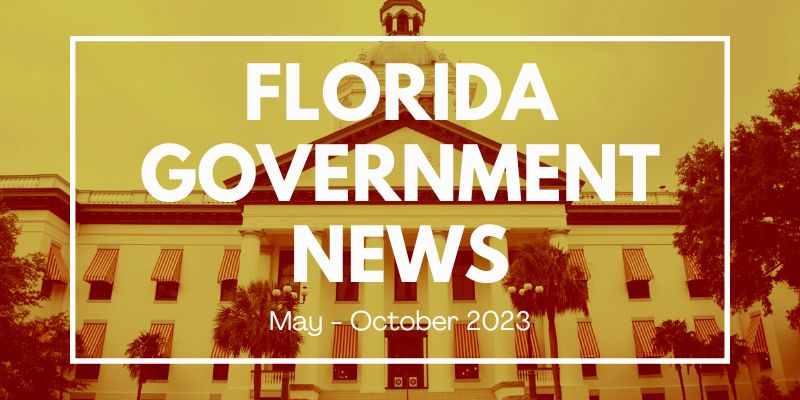
With the Legislature out of session and as a result of Gov. Ron DeSantis’s much-publicized “war on woke” and “use of schools to become a culture warrior”, much of Florida’s public policy news since May was about education.
Education represents 26 percent of our state budget. Informed voters should know about the policy decisions our elected representatives are making and understand how their tax dollars are being spent.
In this post, I’ll summarize some of what I’ve read in the past five months about recent changes to public education and the state’s institutions of higher education that are the result of recently adopted public policy.
But first, I want to note that on Oct. 24, as the war in the Middle East continued in a fourth week, Florida State University System (SUS) Chancellor Ray Rodrigues, in consultation with Gov. DeSantis, ordered chapters of the pro-Palestinian group Students for Justice in Palestine (SJP) “deactivated.” Read more in Rodrigues’s memo to SUS Presidents. (Inside Higher Ed)
Changes to Public Education in Florida
African American History Standards

In July, the Florida Board of Education unanimously approved new standards for its Black history curriculum in public schools.
The new standards include controversial language about how “slaves developed skills which, in some instances, could be applied for their personal benefit,” according to a 216-page document about the state’s 2023 standards in social studies, posted by the Florida Department of Education. (NBC News)
The approval of the standards was criticized by activists and teachers in the state. (Time Magazine)
In response, Gov. DeSantis criticized the Biden administration for mischaracterizing the standards and being “obsessed with Florida.” “Democrats like Kamala Harris have to lie about Florida’s educational standards to cover for their agenda of indoctrinating students and pushing sexual topics onto children,” he posted on X (formerly Twitter). (NYTimes)
According to Florida’s “Required Instruction” statute:
The State Board of Education shall develop or adopt a curriculum to inspire future generations through motivating stories of American history that demonstrate important life skills and the principles of individual freedom that enabled persons to prosper even in the most difficult circumstances. This curriculum shall be known as “Stories of Inspiration” …
Read the new standards at the Florida Department of Education website.
Rules on Gender, Bathrooms, and Pronouns
Florida’s teachers and administrators had more than the usual paperwork to deal with when the school year began in August. The new bureaucracy is a result of new laws and regulations that broadly restrict classroom instruction on gender and sexuality, including in high school, and prevent transgender students and staff members from using group bathrooms that match their gender identity. (NYTimes and WPTV)
Sex Education Lesson Reviews

School districts are now required to submit any instructional material used to teach reproductive health, sexually transmitted diseases, and human sexuality for review by the state, according to a Florida Department of Education memo dated Sep. 8.
“Throughout instruction in AIDS, sexually transmitted diseases, or health education,” says the memo, “when such instruction and course materials contains (sic) instruction in human sexuality,” schools must “teach that biological males impregnate biological females by fertilizing the female egg with male sperm; that the female then gestates the offspring; and that these reproductive roles are binary, stable, and unchangeable.” (Tallahassee Democrat)
Standardized Testing
Florida’s newest series of standardized language arts and math tests is called Florida Assessment of Student Thinking (FAST). Unlike its predecessors, it is a progress-monitoring assessment that will be administered to students in pre-K through 10th grade three times each school year. The exam tracks a student’s progress in learning the required reading and mathematics materials within Florida’s Benchmarks of Excellent Student Thinking (B.E.S.T.) Standards. (Herald-Tribune)
Recently, the State Board of Education adopted the scoring plan for the FAST tests. Students took the FAST last school year, but it was scored on a system devised for the test that was retired in 2022.
The new plan affects current 10th graders set to graduate from high school in 2026. (Orlando Sentinel)
An Alternative to SAT, ACT Exams

The Florida Board of Governors voted in September to require that state universities accept the Classic Learning Test (CLT), a controversial standardized testing alternative to the SAT and ACT, on applications to its 12 campuses starting this fall. (Inside Higher Ed)
Backed by Christian schools and conservative political groups, the CLT was first introduced in December 2015 and is currently accepted by over 250 American colleges and universities. (The Hill and the CLT website)
More Oversight of Classroom Materials
In August, the Florida Board of Education adopted new rules that allow parents to appeal school district decisions on what materials can be used in classrooms or school libraries. The new rule, required under HB 1069, is another way for parents to control what their public school students can and cannot access in school and classroom libraries. (Tallahassee Democrat)
Last year, Gov. DeSantis signed the Curriculum Transparency Act, which requires districts to catalog every book they offer and put a formal review process in place for complaints. As a result, school districts across Florida purged about 300 titles from their library shelves, fearing repercussions if they were found to have books in their classroom libraries deemed “harmful to minors.”
In Collier County, there were seven objections and zero removals. (NBC News and the 16-page FDOE document that includes the book list)
PragerU Materials Approved for Teaching Civics and Government

In late July, Florida became the first state to approve the use of PragerU Kids videos in K-12 schools. PragerU is a nonprofit co-founded by conservative radio host Dennis Prager which “promote[s] American values“ by “offer[ing] a free alternative to the dominant left-wing ideology in culture, media, and education.” (NPR.org, WUSF Public Media, and Education Week)
PragerU Kids offers 14 programs “created to inoculate children against the woke and anti-American leftist narrative taught in most schools, while enriching students with a fun, engaging education,” according to the PragerU 2023 Biannual Report.
Help for Charter School Operators
Until now, only school boards, state colleges, and universities had the power to act as “sponsors” of charter schools in Florida (i.e. to authorize the schools to operate). Sponsors are also responsible for monitoring and reviewing charter schools’ performances, revenues, and expenditures.
But in 2022, Gov. DeSantis signed a bill creating a new Charter School Review Commission that also can approve new charter schools.

Then state senator (2018-2022) and current Education Commissioner Manny Diaz Jr. sponsored the legislation that led to the commission’s creation. He characterized it as a way to streamline the process of charter companies applying to open schools. (News Service of Florida)
“If you have a successful operator that Florida is trying to bring into the state, under the old system, that operator would literally have to go possibly to 67 different [county school board] sponsors to apply,” Diaz said. “What this will do is allow the Commission to take applications from multiple counties and reduce the burden to get these applications reviewed and approved.” (The Capitolist)
Government watchdogs argued when the bill was being considered that Diaz’s involvement was a conflict of interest since he was also working (2013-2022) as chief operating officer of Doral College, which is affiliated with the for-profit charter school service provider Academica. (Chartered/WLRN.org)
In October, Diaz and the State Board of Education chose the members of the commission and approved the rule for how the Charter School Review Commission will operate. Under the new rule, if the commission approves a charter school application, the school board in the district where the charter school would be located would be required to serve as the sponsor of the school. View the presentation about the rule to the FDOE here.
Reshaping Higher Ed
Not only have there been significant changes to K-12 education in Florida, as reported above. Gov. DeSantis is using his power to appoint trustees to the Board of the State University System to change the leadership of Florida’s public colleges and universities.
New College of Florida

On Friday, Jan. 6, 2023, DeSantis appointed six new members to the Board of Trustees of New College of Florida. Among them is Christopher Rufo, a Senior Fellow at the Manhattan Institute who recently led the fight against critical race theory in American institutions.
“We are now over the walls and ready to transform higher education from within,” Rufo tweeted within minutes of the announcement. (NYTimes)
The following Monday, he tweeted, “We are organizing a ‘hostile takeover of a liberal college.’”
Among the new Board’s first acts was to fire its president and appoint then-state Education Commissioner Richard Corcoran to serve as interim president. Earlier in the day, DeSantis proposed legislation to revamp parts of the state’s public higher-education system, including barring funding for diversity, equity and inclusion programs and tightening review of faculty tenure.
Read more at Wall Street Journal and I Was President of Florida’s New College. Then I Was Fired, by Patricia Okker in The Chronicle of Higher Education.
As students protested against a “conservative overhaul of the school,” trustees also voted to abolish diversity, equity and inclusion programs and deny tenure to five faculty members. (Tampa Bay Times and CNN)
In October, Corcoran got the job permanently, with a $1 million-plus compensation package that puts him on par with the highest-paid college president in the state, University of Florida’s Ben Sasse. UF has over 55,000 students, compared to under 700 at New College. (WLRN Public Media)
Florida Polytech
Most recently, DeSantis took steps to reshape Florida Polytechnic University by appointing two notable critics of diversity, equity and inclusion practices in higher education to its Board of Trustees. The move was considered “part of the state’s ongoing quest to eliminate DEI practices in public institutions.” (Inside Higher Education)
Florida Polytechnic, which has an enrollment of around 1,600 students, is another of the smallest institutions in the State University System.
In my next update on our Florida government, I will write about what happened at the special legislative session called for Nov. 6-9. A series of issues, including bolstering state sanctions against Iran and providing additional assistance to people after Hurricane Idalia, are expected to be addressed.
